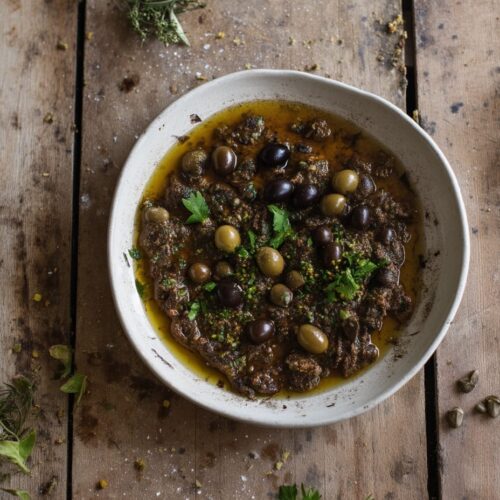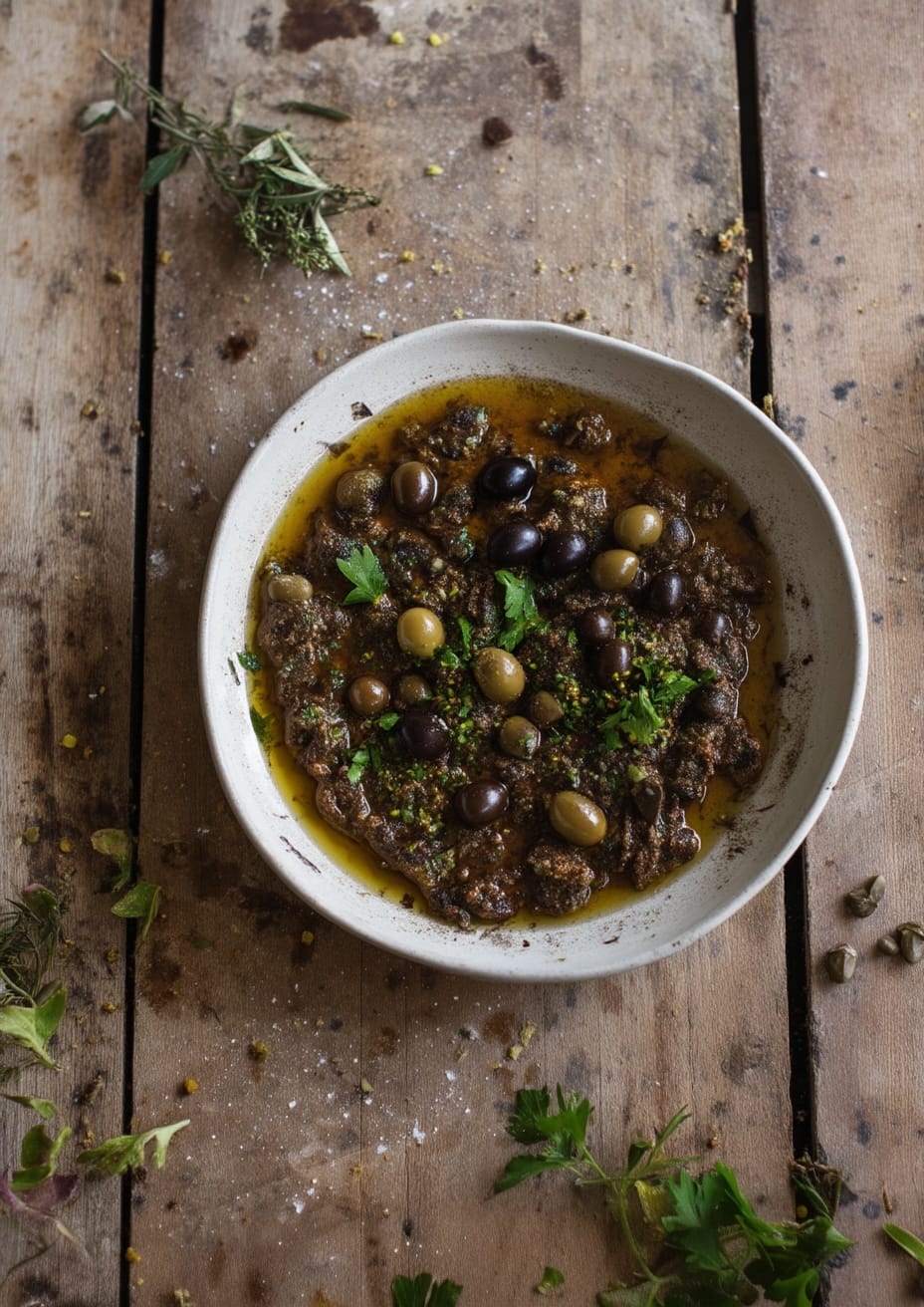A briny tapenade that celebrates Spanish pantry staples
Anchovies divide opinion, but in the right setting, they add depth and savoury richness that can’t be matched. This Spanish tapenade with anchovies and capers is proof. It’s not fishy, as people often fear, but rather deeply umami, salty in the right way, and perfectly rounded. It’s the kind of dip that wakes up the palate before a big meal.
I first encountered this style of tapenade in coastal Catalonia, where anchovies are treated with almost reverence. Locally cured ones, tender and salty, are often laid across bread smeared with tomato. Adding them into tapenade with capers feels like a natural progression — both ingredients are pantry staples in Spanish kitchens and together they create a spread that’s vibrant and bold.
Capers bring a piquant bite, slightly floral, slightly citrusy, cutting through the oiliness of olives and anchovies. The overall effect is balanced and addictive. Compared with the smoky sun-dried tomato tapenade, this one is brighter and sharper.
This recipe is part of my larger collection of Spanish tapenade recipes. It’s the one I recommend for anyone who wants a quick spread that feels rooted in tradition, yet exciting enough for a modern tapas night. Pair it with rustic bread, roasted peppers from my Spanish vegetable tapas recipes, or serve it alongside hearty Spanish meatballs.
Ingredients for Spanish tapenade with anchovies and capers
- 200g pitted black olives
- 3 anchovy fillets in olive oil
- 1 tablespoon capers, rinsed
- 2 garlic cloves
- 2 tablespoons extra virgin olive oil
- 1 teaspoon lemon juice
- 1 teaspoon sherry vinegar
- Sea salt to taste
- Black pepper to taste
Ingredient notes
Anchovies packed in oil are softer and easier to blend than salt-packed ones. If you do use the latter, rinse thoroughly and soak briefly in milk or water to remove excess salt before adding them to the tapenade.
Capers can vary in intensity. Nonpareil capers, the smaller kind, tend to be less brash and more floral, making them perfect here. Larger ones, like caper berries, are too intense and should be avoided unless chopped very finely.
Instructions
Place the olives, anchovies, capers, and garlic into a food processor. Pulse until coarsely chopped. Slowly drizzle in olive oil while pulsing to achieve a chunky paste. Add lemon juice and vinegar, then season cautiously with salt and pepper — anchovies and capers already carry plenty of salinity.
For a more hands-on version, mash the anchovies with garlic in a mortar until smooth, then stir in chopped olives and capers. This method produces a more rustic texture where each ingredient maintains its identity.
Cooking techniques explained
Anchovies dissolve quickly under pressure, so when using a mortar, they’ll almost melt into a paste with garlic. This creates a savoury base that flavours the entire mixture. It’s a technique worth practising because it produces a tapenade that feels more alive, less homogenised.
Balancing acid is particularly important here. Lemon juice brings freshness, while sherry vinegar adds a deeper tang. Both are needed, but they should be added gradually and tasted often, as too much can overpower the delicate flavour of anchovies.
What to serve with this recipe
Spread it thinly on toasted baguette or crackers as part of a tapas spread. The saltiness pairs well with drinks, making it a great aperitivo. It also works beautifully stirred through warm pasta or spooned over grilled fish. The anchovies enhance the flavour of the seafood without being dominant.
Wine and beer pairings
Albariño is a natural match, its acidity refreshing the palate between bites. Another option is Txakoli, a slightly spritzy Basque white wine that pairs well with salty foods. For beer, a crisp pilsner offers a clean contrast, while a saison with peppery notes picks up on the briny, herby tones of the tapenade.
FAQ about anchovy and caper tapenade
Will the tapenade taste too fishy?
No. Anchovies melt into the mix, leaving depth and savouriness rather than a strong fish flavour. If you’d like something less bold, try my garlic and herb olive tapenade.
Can anchovy tapenade be made without capers?
Yes, but it loses some brightness. If you don’t have capers, add a little extra lemon juice. For a sweeter option, look at my red pepper and almond tapenade.
How long does anchovy tapenade last?
Stored in a sealed jar in the fridge, it will keep for up to four days. See storage advice below for more detail.
Can I make this vegan?
Anchovies are essential here, but for a vegan option, my artichoke and parsley tapenade is a perfect alternative.
Tips for success with anchovy Spanish tapenade
Go slowly with the salt. It’s tempting to season early, but always taste after blending since anchovies and capers are already salty. A little restraint ensures balance. Use good-quality anchovies. Cheap ones tend to be harsh, while better brands are mellow and almost buttery. They make all the difference in the finished dish.
Recipe variation suggestions
Add a few chopped sun-dried tomatoes for sweetness, balancing the salty edge. This creates a hybrid between the classic anchovy tapenade and my smoky sun-dried tomato version. For a more herbaceous variation, stir in fresh parsley and a touch of oregano. It creates a fresher flavour that works well in spring and summer when herbs are abundant.
Storage and reheating anchovy Spanish tapenade
Store in a sealed jar with a drizzle of olive oil on top to prevent oxidation. It will last for four days in the fridge. For longer storage, freeze in small portions. Reheating isn’t needed, but if using with pasta, gently warm in a pan with a splash of olive oil before tossing with cooked noodles.
Anchovies Are a Great Ingredient
Anchovies can seem intimidating, but when blended they act as a natural seasoning rather than a standout ingredient. They dissolve, bringing depth and complexity. Capers add brightness but can be swapped with finely chopped cornichons if unavailable. They bring acidity and crunch, though the flavour is slightly different.

Easy Spanish Tapenade with Anchovies and Capers
Ingredients
- 200 g black olives pitted
- 3 Anchovy fillets in olive oil
- 1 tbsp Capers rinsed
- 2 cloves Garlic
- 2 tbsp Olive oil extra virgin
- 1 tsp Lemon juice
- 1 tsp Sherry vinegar
- Sea salt to taste
- Black pepper to taste, freshly ground
Instructions
- Place the olives, anchovies, capers, and garlic into a food processor. Pulse until coarsely chopped. Slowly drizzle in olive oil while pulsing to achieve a chunky paste. Add lemon juice and vinegar, then season cautiously with salt and pepper — anchovies and capers already carry plenty of salinity.
- For a more hands-on version, mash the anchovies with garlic in a mortar until smooth, then stir in chopped olives and capers. This method produces a more rustic texture where each ingredient maintains its identity.

